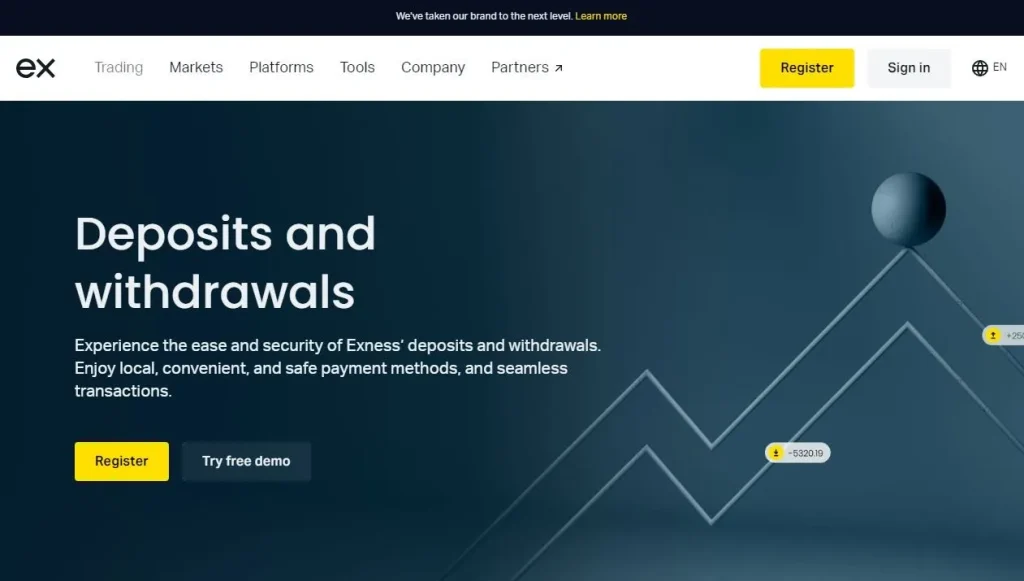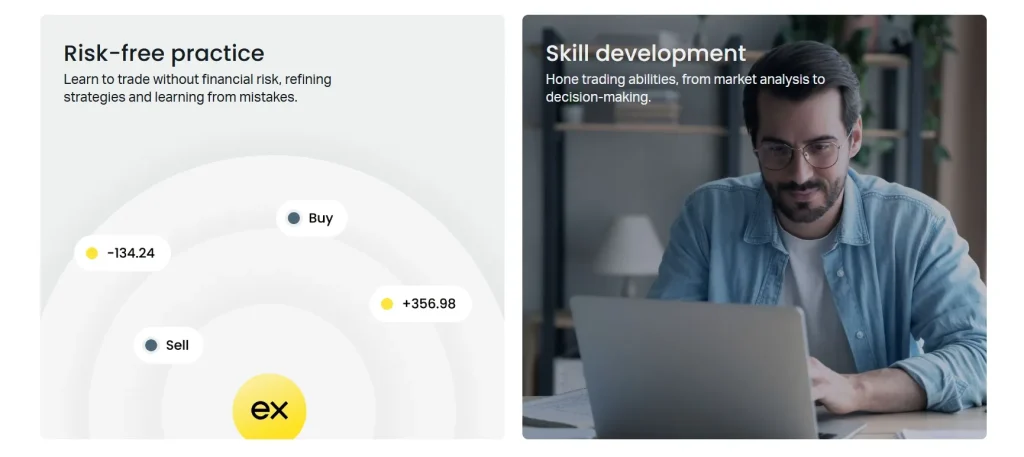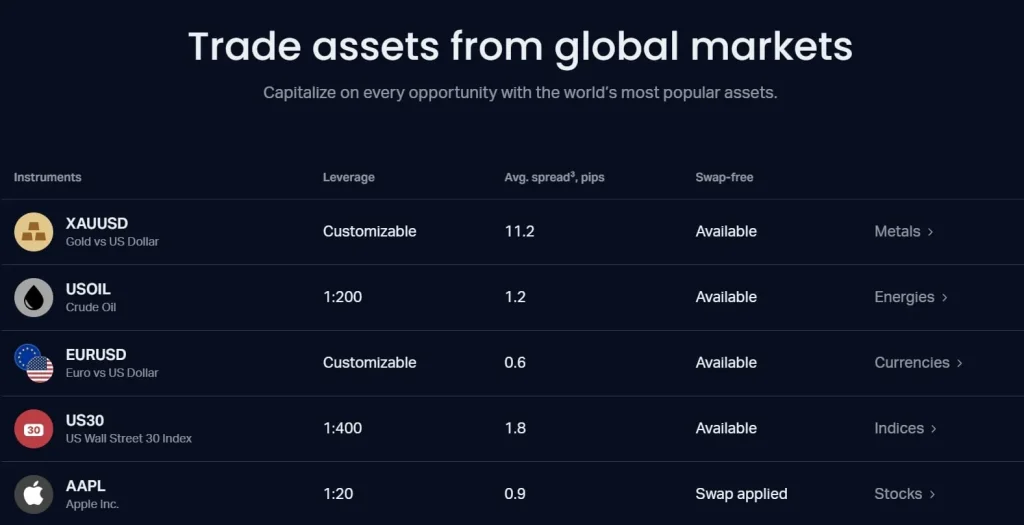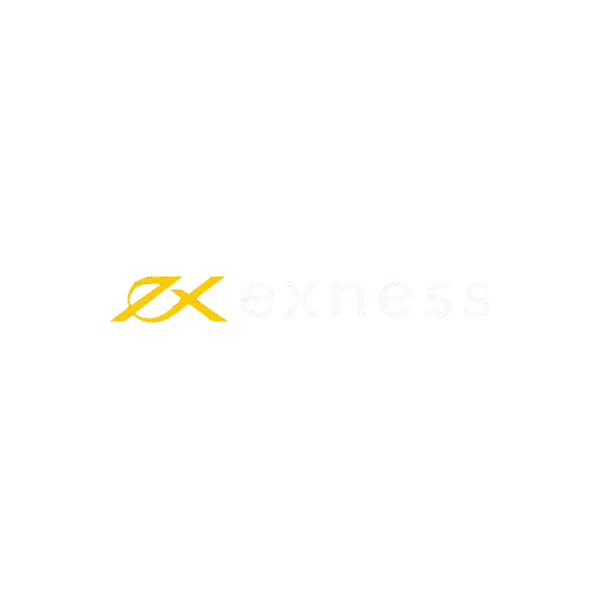Home » Exness Charges
Account Types and Associated Fees
Exness offers multiple account types to Indian traders. Each account type has a specific fee structure.
Trading costs vary based on account selection. Understanding these differences helps optimize trading expenses.
Standard Account Charges
Standard accounts provide variable spreads without commissions. The spread serves as the primary cost.
Currency Pair | Average Spread | Minimum Spread |
EUR/USD | 0.9 pips | 0.3 pips |
GBP/USD | 1.1 pips | 0.5 pips |
USD/JPY | 1.0 pips | 0.3 pips |
AUD/USD | 1.3 pips | 0.6 pips |
USD/INR | 18.0 pips | 12.0 pips |
Standard accounts require no minimum deposit. No commission applies to trades.
Trading cost calculation follows this formula: Spread × Lot Size × Contract Size = Total Cost.
Zero Account Charges
Zero accounts feature zero spreads on major instruments with a commission structure. This setup appeals to high-frequency traders.
Commission rates:
- $3.5 per standard lot per side
- $7.0 per lot for a complete round trip (open and close)
- Charged in account currency equivalent
The minimum deposit requirement stands at $200 (approximately ₹16,500). Commission applies upon trade execution.
Raw Spread Account Charges
Raw Spread accounts offer institutional-grade spreads with commission. These accounts target professional traders.
The commission structure mirrors Zero accounts:
- $3.5 per lot per side
- $7.0 per lot round trip
- Charged in account currency equivalent
The minimum deposit equals $200 (approximately ₹16,500). Available exclusively on MT5 platform.

Deposit and Withdrawal Fees
Understanding transaction costs helps Indian traders plan their fund transfers effectively.Deposit Methods and Charges
Exness charges no fees for deposits. Third-party providers may apply their own fees.| Payment Method | Exness Fee | Provider Fee | Processing Time |
| UPI | ₹0 | Varies | Instant |
| NetBanking | ₹0 | Varies | 1-24 hours |
| Indian Cards | ₹0 | 0-2% | Instant |
| E-wallets | ₹0 | 0-2.5% | Instant |
| Bank Transfer | ₹0 | Bank dependent | 1-5 business days |
| Cryptocurrency | ₹0 | Network fee | 30-60 minutes |
Withdrawal Charges
Exness applies no direct withdrawal fees. Third-party processors may charge their own fees.| Withdrawal Method | Exness Fee | Provider Fee | Processing Time |
| UPI | ₹0 | Varies | Up to 24 hours |
| Bank Transfer | ₹0 | Bank dependent | 1-5 business days |
| E-wallets | ₹0 | 0-2% | Up to 24 hours |
| Cryptocurrency | ₹0 | Network fee | 30-60 minutes |
Currency Conversion Fees
Currency conversion occurs when:- Depositing INR to a USD account
- Withdrawing USD to an INR payment method
- Trading instruments denominated in currencies other than the account currency
- Match account currency with primary deposit/withdrawal method
- Use INR-denominated accounts when primarily using Indian payment systems
- Monitor exchange rates before large transfers

Swap Rates and Overnight Fees
Positions held open overnight incur swap fees. These fees reflect interest rate differentials between currencies.
Swap Calculation Method
Swap rates calculate as:
- Lot size × Contract size × Swap rate in points × Point value
Rates differ for long and short positions. Rates triple on Wednesday to account for weekend.
Currency Pair | Long Swap Rate | Short Swap Rate |
EUR/USD | -0.69 | -2.32 |
GBP/USD | -0.82 | -2.95 |
USD/JPY | 0.3 | -6.52 |
USD/INR | -12.57 | 0.88 |
XAU/USD | -5.21 | -1.23 |
Swap-free options exist for eligible traders. Check current rates through terminal or website.
Inactivity Fees
Exness charges no inactivity fees. Dormant accounts remain accessible without penalty.
The absence of inactivity fees benefits:
- Seasonal traders
- Investors with long-term positions
- Traders who pause activities during market uncertainty
Account funds remain intact regardless of inactivity duration. Login periodically to maintain familiarity with platform updates.
Leverage-Related Charges
Leverage itself incurs no direct fees. However, higher leverage increases margin requirements and potential swap costs.
Margin Requirements
Margin calculation: Contract value ÷ Leverage = Required margin
Lower leverage requires more capital per position. Higher leverage permits more positions per capital unit.
Leverage | Margin Requirement for 1 Lot EUR/USD (Contract Value $100,000) |
1:2000 | $50 (₹4,125) |
1:1000 | $100 (₹8,250) |
1:500 | $200 (₹16,500) |
1:200 | $500 (₹41,250) |
1:100 | $1,000 (₹82,500) |
1:50 | $2,000 (₹165,000) |
Indian traders qualify for up to 1:2000 leverage. Eligibility depends on trading history and account equity.

Hidden Costs and Additional Charges
Beyond direct fees, traders should consider indirect costs that impact trading profitability.
Slippage
Slippage occurs when execution price differs from requested price. More common during market volatility.
Market execution accounts experience more slippage than instant execution accounts. Zero and Raw Spread accounts use market execution.
Requotes
Standard accounts with instant execution may experience requotes during volatile markets. This represents an indirect time cost.
Zero and Raw Spread accounts avoid requotes through market execution model. Price confirmed at actual execution.
Stop Out Levels
Stop out occurs when margin level falls below threshold:
- 10% for unlimited leverage accounts
- 30% for standard leverage accounts
No direct fee applies, but forced position closure may occur at unfavorable prices. Proper risk management prevents stop-outs.
Comparing Account Types for Cost Efficiency
Account selection impacts overall trading costs. Each type suits different trading styles.Cost Comparison by Trading Volume
| Account Type | Low Volume (<10 lots/month) | Medium Volume (10-100 lots/month) | High Volume (>100 lots/month) |
| Standard | Most economical | Moderate cost | Expensive |
| Zero | Expensive | Economical | Most economical |
| Raw Spread | Expensive | Economical | Most economical |
Trading Style Compatibility
| Trading Style | Recommended Account | Reasoning |
| Scalping | Zero or Raw Spread | Fixed costs, zero/low spreads |
| Day Trading | Zero or Raw Spread | Predictable commission structure |
| Swing Trading | Standard or Zero | Depends on trade frequency |
| Position Trading | Standard | Lower overnight costs |
| Algorithmic Trading | Raw Spread | Consistent execution pricing |
Legal and Regulatory Fees
Indian traders face no direct regulatory fees when using Exness. However, tax obligations remain.Tax Implications
Profits from forex trading may be taxable under Indian income tax laws. Potential classifications include:- Business income
- Capital gains
- Speculative business income
Foreign Remittance Considerations
The Liberalised Remittance Scheme (LRS) allows Indian residents to remit up to $250,000 per financial year. Transactions count toward this limit. Banks may require documentation for transactions. Keep trading records for compliance purposes.How to Calculate Total Trading Costs
Understanding total costs helps forecast profitability. The calculation differs by account type.Standard Account Cost Calculation
Formula: (Spread in pips × Pip value × Lot size) + Swap costs (if applicable) Example for 1 lot EUR/USD trade held for 1 day:- Average spread: 0.9 pips
- Pip value for 1 standard lot: $10
- Cost: 0.9 × 10=10 = 10=9.00 (₹742.50)
- Plus applicable swap fees
Zero/Raw Spread Account Cost Calculation
Formula: (Commission per lot × Lot size × 2) + (Spread × Pip value × Lot size) + Swap costs Example for 1 lot EUR/USD trade held for 1 day:- Commission: 3.5×2=3.5 × 2 = 3.5×2=7 (₹577.50)
- Spread cost: 0.0 × 10=10 = 10=0
- Total: $7.00 (₹577.50)
- Plus applicable swap fees
Frequently Asked Questions
Does Exness charge account maintenance fees in India?
No account maintenance fees apply. Accounts remain active without monthly or annual charges regardless of balance or activity level.
Are there fees for opening multiple accounts?
No charges apply for maintaining multiple accounts. Traders can operate different account types simultaneously without additional costs.
How can I minimize currency conversion costs?
Select an account currency matching your primary funding method. INR-denominated accounts eliminate conversion fees when using Indian payment methods.
Does Exness charge for demo accounts?
All demo accounts remain free of charge. Practice accounts offer identical features to live accounts without real money risk.
Are there charges for using the mobile app?
The Exness mobile application downloads and operates without fees. Data charges from mobile carriers may apply.
Does Exness charge for educational resources?
All educational materials, webinars, and market analysis remain free for account holders. No subscription fees apply to knowledge resources.


